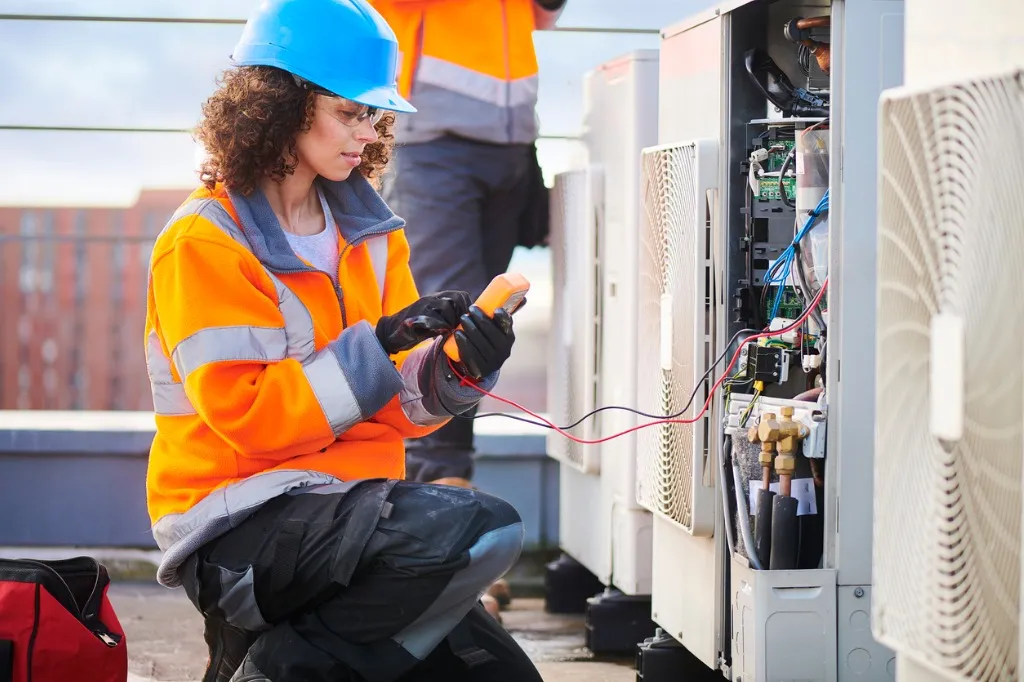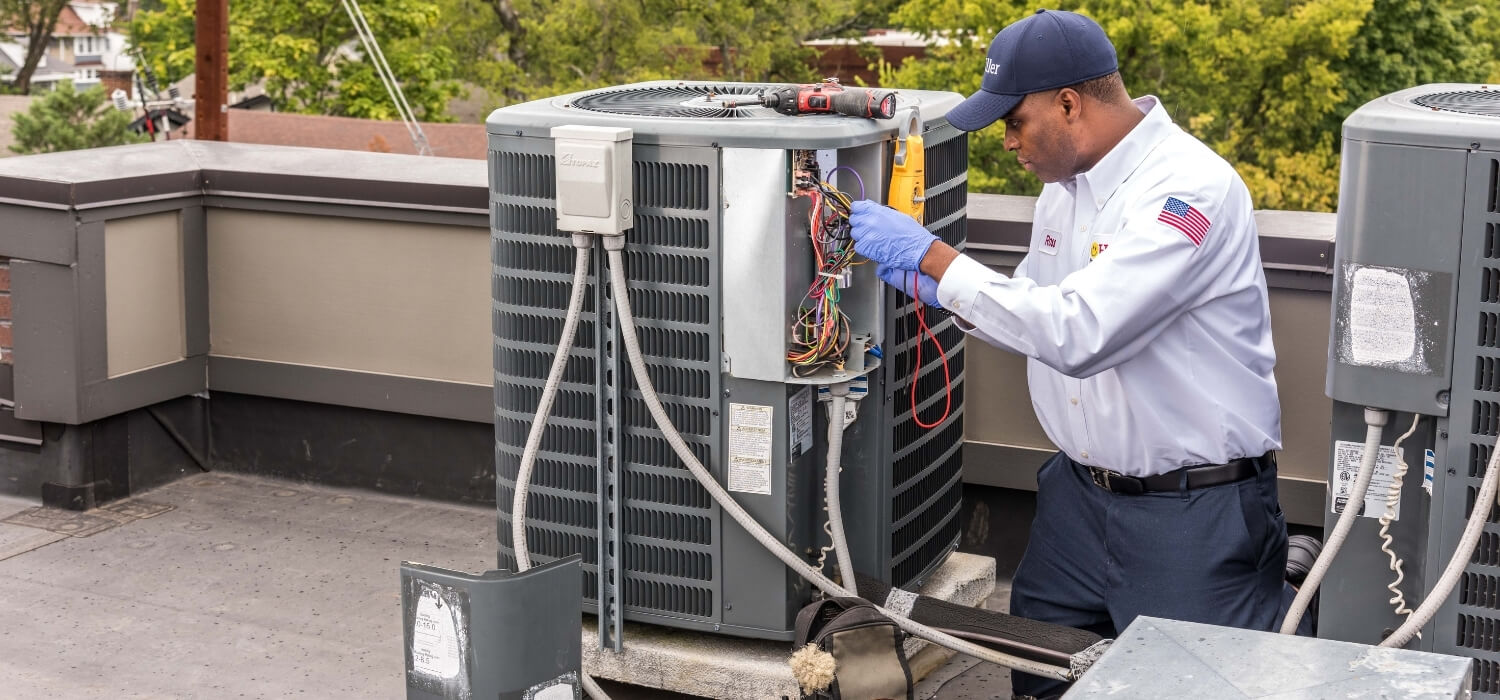Commercial HVAC Installation Solutions for Large-Scale Air Conditioning Equipments
Commercial HVAC Installation Solutions for Large-Scale Air Conditioning Equipments
Blog Article
A Thorough Check Out Heating And Cooling Providers and Their Influence On Energy Efficiency and Price Savings
With technological developments like wise thermostats and high-efficiency elements, the capacity for maximizing system efficiency is vast. As we discover the complex connection between A/c systems and operational costs, including the shift towards eco pleasant alternatives, the inquiry emerges: exactly how can these approaches be properly executed to maximize both financial and ecological benefits?

Relevance of Heating And Cooling Equipments
a/c systems are an essential part of contemporary buildings, playing a vital duty in preserving comfortable and healthy interior atmospheres. These systems, including air, ventilation, and heating conditioning, are necessary for regulating temperature level, moisture, and air quality, thereby guaranteeing the well-being of owners. Efficient cooling and heating systems add considerably to developing an ideal indoor environment, which is important for both industrial and household areas.
In business structures, heating and cooling systems are integral to giving a secure and productive setting. By controlling indoor environment conditions, these systems aid stop the growth of mold and mildew and the spread of airborne pollutants, hence securing the health and wellness of employees and clients. Additionally, in household settings, HVAC systems boost living conditions by providing regular thermal convenience and enhancing indoor air top quality, which is crucial for total health and wellness.
Moreover, the design and upkeep of a/c systems have a straight influence on power consumption and operational expenses. Appropriately designed and maintained systems can dramatically reduce power use, leading to decreased utility costs and a smaller carbon footprint. The effectiveness of these systems hence plays an essential duty in advertising sustainability and power conservation within buildings, highlighting their significance in the modern-day building landscape.
Advances in HVAC Technology
Development in heating and cooling innovation is reinventing the method structures take care of indoor climates, introducing a new age of performance and control. Recent improvements have actually focused on enhancing power intake while improving individual convenience. One notable development is the assimilation of smart thermostats, which use man-made intelligence to learn tenancy patterns and adjust temperatures accordingly, minimizing unnecessary energy use.
Variable Refrigerant Circulation (VRF) systems represent another significant jump ahead. These systems enable for specific temperature control in various zones of a structure, enhancing comfort and decreasing energy waste. VRF technology is particularly advantageous for huge business areas, offering versatility and scalability.
Furthermore, the arrival of Web of Points (IoT) gadgets has actually transformed heating and cooling systems into interconnected networks with the ability of real-time data collection and analysis. This connection enables anticipating maintenance, guaranteeing systems run at peak effectiveness and decreasing unanticipated downtime.
Additionally, advancements in products and layout, such as making use of high-efficiency coils and compressors, have actually enhanced overall system efficiency - Heating Contractor. The adoption of eco-friendly refrigerants likewise underscores the sector's commitment to sustainability
These technological advancements are essential in decreasing operational expenses and ecological effect, setting new criteria for developing environment management.
Cooling And Heating Maintenance and Performance
Guaranteeing ideal efficiency of HVAC systems expands past technical developments; it likewise rests on efficient maintenance practices. Routine upkeep is crucial for sustaining performance, minimizing power intake, and extending the lifetime of a/c systems. The key objective is to make sure that all parts operate at their peak capacity, consequently decreasing energy wastage and preserving constant indoor comfort levels.
Regular upkeep tasks, such as cleaning or replacing air filters, examining refrigerant levels, and examining ductwork for leakages, are essential for preventing unnecessary strain on the system. Clogged or unclean filters can obstruct air movement, causing the system to function more difficult and take in more energy. Likewise, insufficient cooling agent degrees can lower cooling down performance, causing higher functional prices.
Additionally, regular examinations by certified experts can determine prospective issues prior to they intensify right into pricey fixings or system failings. These evaluations often consist of examining electrical links, calibrating thermostats, and guaranteeing the total stability of the heating and this post cooling system. By attending to minor troubles early, businesses and property owners can prevent unexpected breakdowns and boost power performance.
Cost-efficient Cooling And Heating Solutions
For those aiming to get one of the most out of their home heating, air, and air flow conditioning systems without breaking the bank, checking out cost-effective heating and cooling solutions can make a significant distinction. One immediate action is to purchase programmable thermostats, which enable customers to set certain temperatures for various times of the day, optimizing power use and reducing unneeded consumption. By automating temperature adjustments, property owners can achieve significant savings on energy expenses.
Regular maintenance is another important part of cost-efficient heating and cooling administration. Making certain that filters are cleaned or changed on a regular basis, ductwork is secured, and units are serviced by professionals can avoid expensive repair work and improve system durability. Precautionary maintenance not only maintains system efficiency but additionally helps in look at this now avoiding unanticipated failures that can bring about pricey emergency situation repair services.
Additionally, retrofitting existing systems with energy-efficient components, such as variable speed electric motors or high-efficiency compressors, can be a prudent investment. These upgrades boost functional efficiency, reduce power usage, and can typically be carried out at a fraction of the price of a complete system replacement.
Environmental Influence Decrease
Reducing the ecological influence of A/c systems is crucial in today's quest of lasting living. Heating and cooling systems are substantial factors to energy usage, accounting for virtually 40% of power use in commercial buildings.
Technological innovations in heating and cooling style and operation, including the integration of smart thermostats and energy-efficient heatpump, are critical in minimizing carbon footprints. These developments enable enhanced energy usage, reducing wastefulness and boosting general system efficiency. Furthermore, adopting regular maintenance techniques makes certain HVAC systems run at peak efficiency, additional stopping unnecessary energy consumption.
In addition, making use of ecologically pleasant refrigerants is important, as conventional cooling agents, like CFCs and HCFCs, have actually been eliminated due to their ozone-depleting residential or commercial properties. Modern choices, such as hydrofluoroolefins (HFOs), deal decreased environmental threats, aligning with global environmental procedures. By welcoming these lasting methods, cooling and heating solutions can play a transformative duty in decreasing environmental effects, advertising power efficiency, and cultivating a much more sustainable future.
Verdict

In addition, the style and upkeep of Cooling and heating systems have a direct effect on energy intake and operational expenses. Normal maintenance is crucial for sustaining effectiveness, reducing energy consumption, and prolonging the life span of Cooling and heating systems. HVAC systems are considerable contributors to energy consumption, accounting for virtually 40% of power usage in business buildings. Furthermore, embracing regular maintenance methods ensures Heating and cooling systems operate at peak efficiency, further cutting unnecessary energy consumption.
The transition to environmentally friendly Heating and see this website cooling systems even more promotes and minimizes functional expenses sustainability. (Heating Contractor)
Report this page